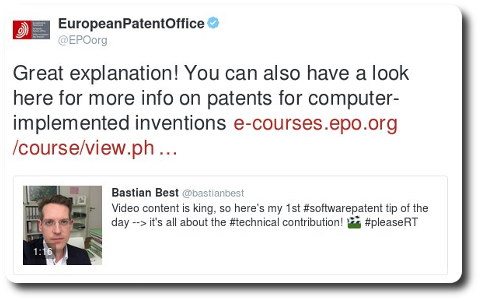

Software patents in EPO vocabulary is "CII", which is just a trick for avoiding the more controversial term, "software patents". The EPO has used the misleading term for at least a decade and yesterday it wrote the above. "Great explanation," it said. "You can also have a look here for more info on patents for computer-implemented inventions..."
"KIPO and JPO have probably become better than the EPO (in terms of quality) after that Battistelli 'reform', which basically meant reducing the Office to rubbish."Bastian Best, who has a blog dedicated to software patents in Europe (promoting them), has been flirting with the EPO for quite some time and writing almost exclusively in support of software patents. Why does the EPO promote these patents against its own rules? So desperate for fresh patent applications? We have been hearing that application inventories (backlog) are rapidly running out, which means that staff will become redundant. Is the EPO's unofficial strategy to just lower patent quality, expand patent scope, and hope that lots of rubbish patent applications will come flooding in?
The use or misuse of "CII" as a euphemism/weasel word is not new to us. We already saw the devastating effect of such patents in the US, where the USPTO, PTAB, CAFC, etc. belatedly undo the mistakes and attempt to repair the damage. A famous CAFC judge recently said that software patents are in conflict with free speech and are thus, arguably, unconstitutional.
Yesterday the EPO wrote: "What changes to the law are coming up in Japan & Korea?"
Well, Korea already forbids software patents for example, among other low-quality patents. KIPO and JPO have probably become better than the EPO (in terms of quality) after that Battistelli 'reform', which basically meant reducing the Office to rubbish. What happens when everyone finds out? As we shall show in our next post, stakeholder are already finding out. ⬆